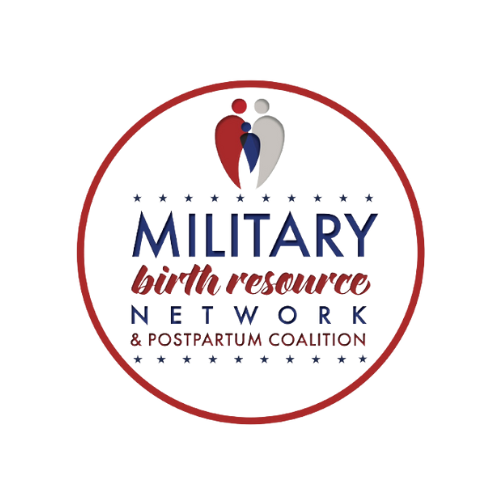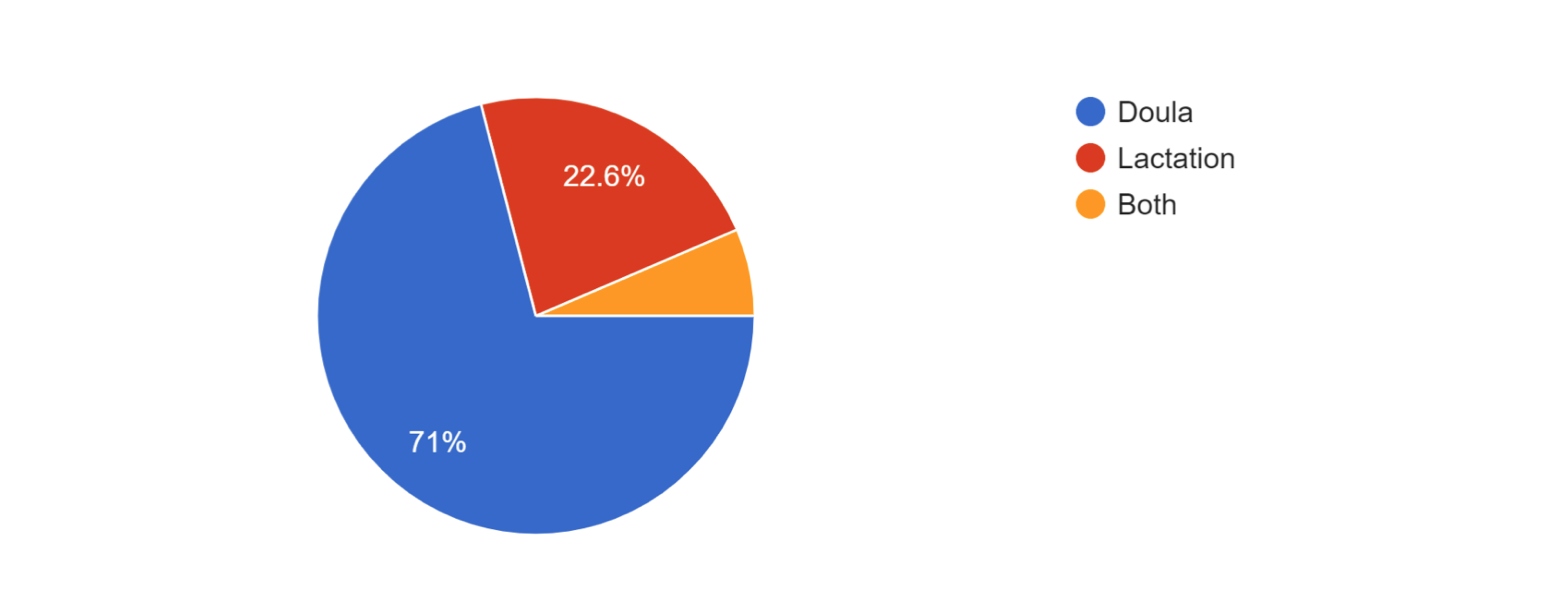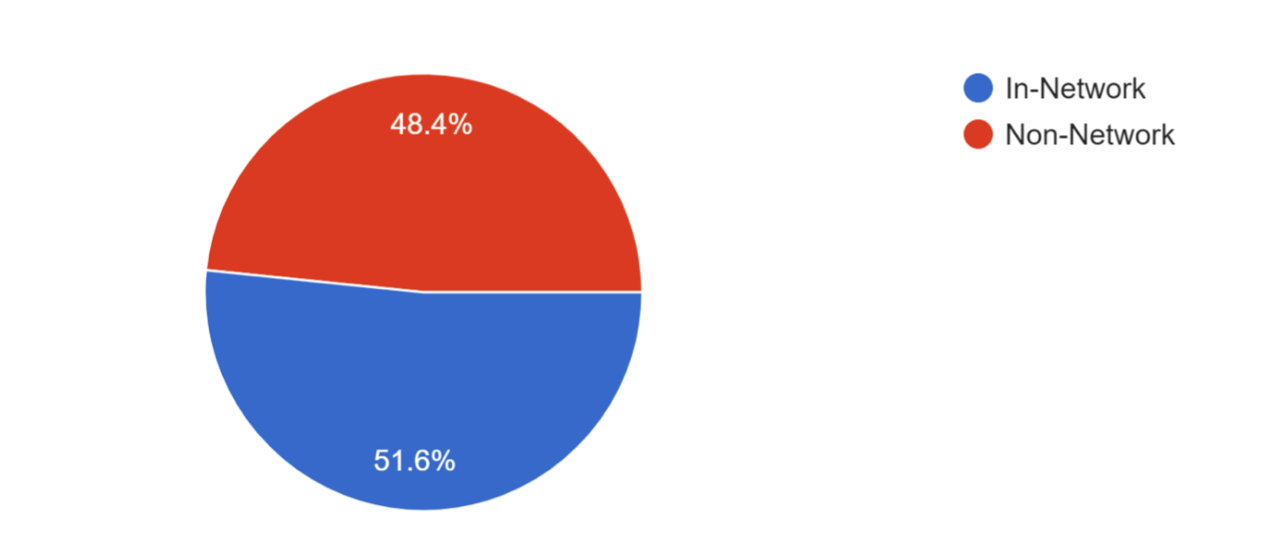
Beneficiary
&
Provider Responses
The Military Birth Resource Network and Postpartum Coalition released a survey the beginning of 2023 in hopes of gaining further insight on the experiences Doulas and Beneficiaries are having with the Tricare Childbirth & Breastfeeding Demonstration Pilot Program. Our survey was pushed through social media outlets and MBRNPC’s email list. Below are the results. To the best of our knowledge Tricare West has integrated a better Guide for those participating in the program which included a specific point of contact for doulas and lactation professionals. Tricare East, also provides a Resources for Providers and Beneficiaries, but does not have a specific point of contact for providers.
There are many frustrations and concerns about the demonstration. Our recommendation to the Defense Health Agency is to include doulas and lactation professionals who are either military spouses or have worked closely with the military community to help advise and offer input in the continual development of this program.
Thank you to everyone who participated in this study. Your input and voice matters.
The Results
We surveyed the following categories
Tricare Beneficiaries Responded
Tricare Providers Responsed
Beneficiary Responses
Out of the 78 people, we found that 71.8% of Beneficiaries were on Tricare Prime 19.2% were on Tricare Select
48 Beneficiaries were Service Members, 30 Dependents.
We asked how many utilized a doula through the Tricare Demonstration.
Only 15 people utilized a Doula through the Tricare Demonstration, 63 did not.
For the those who DID utilize a doula through the Tricare Demonstration we asked what influenced the decision to include doula support.
Many beneficiaries decided to use doula support because of their desire for a different birth outcome.
71.2% had a desire for a specific birth outcome
63.5% wanted a support person during labor to advocate for desires
40.4% wanted more education
40.4% listened to recommendations by friends/family on benefits of a doula
38.5% had a lack of support system at their current duty location
38.5% had experienced birth trauma
For the beneficiaries who were not able to use a doula, we asked why.
45.2% said there were no certified providers in their area
43.5% said they did not qualify as they were Tricare Prime Beneficiaries and seen at a military treatment facility (MTF)
40.3% said doulas indicated Tricare certification process was too cumbersome
29% said the doulas indicated reimbursement was too low
22.6% indicated the doula was not certified by one of the five certification agencies approved by Tricare
Provider Responses
We asked what services each provider offered under the Demonstration project.
Out of the 31 responses, 22 were doulas, 7 lactation providers, 2 provided both lactation and doula support.
Region where the provider offers services.
21 in Tricare East, 10 in Tricare West
Provider status, In-Network or Non-Network Providers.
15 Non-Network, 16 In-Network
Time that was being spent communicating with Tricare about provider support.
45.1% of respondents said they spend 3+ hours a month communicating with Tricare support
Most common concerns shared were
Reimbursement rate being too low
Lack of education and training on the part of Tricare contractors
Denied claims with unclear reason
Reimbursement taking too long
Too difficult to get certified
Comments regarding experiences from Tricare beneficiaries and doulas who currently are credentialed by tricare
Feedback from Tricare Beneficiaries
- The fact that I’m excluded for this program because I’m active duty and mandated to be seen at the MTF is sad, frustrating and quite frankly feels like I’m being penalized for being active duty. My spouse is also active duty. If I was merely his dependent I could elect Tricare Select and be seen off base. In that case, I would qualify. In some sense, I feel like I’m being punished for serving my country. Further, it feels as if this is just another gap in women’s healthcare access that is present in the DoD.
- Make it easier for doula's to enroll/receive reimbursement.
- Doulas need to be allowed at MTFs. They aren’t currently and can’t get on base.
- Certification and qualification barriers are a concern for the practitioners. And reimbursement rates too low. Selection of few certified doulas is small and spots fill too quickly to be useful for such a transient military population.
- Needs to be simple or no impact on the doula.
- This program should be considered medically necessary and training should be available at every base to enable doulas to receive payment so that families no longer bear the financial burden of paying to feel safe and supported during a dangerous time for a mother.
- I did a lot of reading before going to my first birth, and my family talked about giving birth while I was growing up, so I was familiar with the process, good signs, and red flags. My first birth experience (without a Doula) had me terrified to give birth again. I did not feel respected throughout the process, and was pushed several times to add drugs I did NOT want (or need) or to prepare myself for a surgery that was completely unnecessary. I ended up having to go back to the same hospital for my second birth - in the room right next door, with the same OB at the foot of my bed while giving birth. I'm convinced, that the only reason I was able to birth my second vaginally (instead of via c-section) is because of the Doulas we had. Both were fabulous (they switched from one to another part way through), and they helped us communicate with the staff to give us time we needed for the birth.
- My previous pregnancy resulted in the death of one of my twins from trauma induced at birth by the providers actions (San Diego). I had no one at the birth with me due to lack of support system and my husband being home with our daughter. I was desperate to have support for this pregnancy and was unable to find any covered. I ended up with another terrible birth experience last week (Fredericksburg) in which providers blatantly disregarded my labor progression and failed to recognize impending birth or perform physical assessment and was verbally berated by nurses who refused to physically assess me or provide assistance for delivery and I ultimately delivered by myself while having to scream for help. Lack of support for my very first pregnancy as well as 2 miscarriages were less than ideal altho without negative outcomes, but there is ABSOLUTELY a need for Military to have access to birth support. The experiences are very frequently negative.
- Using doulas helps birthing women feel safer during a very vulnerable time. Having doctors that outrank you creates a potentially coercive healthcare setting so support is needed to help defend patient’s bodily autonomy. Having a doula is associated with improved birth outcomes.
- TRICARE needs to certify doulas. There can't be no doulas or very few doulas available. Huge, unsat on TRICAREs part in taking care of service members/spouses.
Feedback from Doulas
- I have told Tricare to remove me as a provider. I cannot feed my family for free. I’ve been paid $128 on nearly $1800 worth of claims. It’s egregious. I have also told Tricare recipient that Humana Military hasn’t been paying so I can’t work with them.
- I am trying to remain patient and will decide if I need to withdraw early next year. I am hopeful that Humana Military will be able to get their staff trained to support this project.
- I’m the only doula in my area and families need the support. Trying to stick it out!
- My heart is in this to serve our military. Even though it is at a great cost to me they need support. There is no one more deserving. The lack of support from the Tricare and Health Net Fed Services alone is hard to manage. Especially when we know more about the program than they do.
- I have rejected 20-30 potential clients while I wait to be paid and to see if I get paid.
- I feel like it's a bit false advertising since I am saying I am Tricare authorized but then my clients haven't been paid reimbursed yet.
- It is imperative that the reimbursement rate set at an approved level for this program to actually serve military families in the way it is intended. So few providers will actually work with Tricare because of the status of the reimbursement and also the inconsistencies in the processing of claims. As a military spouse myself, this is heartbreaking because so many families need help, but I also have a high overhead of doing business and can’t work for the *possibility* of being paid $5-7/hour. Please make changes so that families can actually receive the lactation care they so desperately need.
- The claims department needs to be much more knowledgeable. I have called Tricare and they have told me no such program exists and I had to walk them through it to find it on their website. This was over the summer so when the program already existed for 6+ months. Tricare should have provided us with step-by-step directions about what we need to submit and what needs to be on bill so that our clients get reimbursed in a more timely manner.
The mission of MBRNPC is to support healthy, safe, and satisfying pregnancies, births, and postpartum experiences through advocacy and policy that prioritizes equity in access to birth options, lactation education and support, mental health care and culturally competent care for military families across the globe. Military Birth Resource Network and Postpartum Coalition provides a supportive network for military families by developing opportunities for service members, veterans and their families to be a part of a network that provides pregnancy, labor and birth, postpartum, lactation, parenting support and legislative advocacy and education in those areas to military leaders and legislators.















